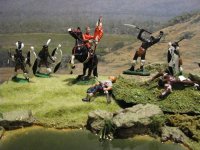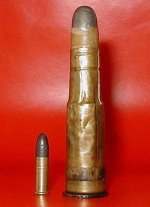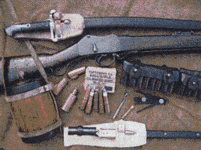Most revisionist historians have sentimentalised the noble Indian as a vulnerable, innocent people who had their lands stolen from them by a rapacious and expansionist USA. The truth is that the Sioux displaced and massacred the Crow from the plains as they had indeed years before pushed the Comanche south who in turn drove the Tinde people into the sterile deserts of the South west where they were renamed the Apache. The Indian was at war with each other long before the whiteman appeared and the massacres they inflicted on each other makes the Wash-ita look insignificant. Likewise the Zulu under Shaka all the way through to Cetwayo; they were warriors and killers and they massacred their own in the hundreds. Now we come to the murderous whites and the treatment meted out on these indigenous people, yes they were corrupt and sometimes evil. We know the greed for Gold was the reason behind the Sioux wars dreamt up by Grant, Sheridan and Sherman while Bartle Frere and Chelmsford dreamt up the Zulu War for a dozen dubious reasons. It's called history and it happened, what version appeals to your view is surely what a debate between like minded guys is all about- Isn't it???? on this forum I'm really beginning to have my doubts.
Well mate you know I am not one to pass over the gauntlet.

As usual, you state many things with which I agree. So let me just touch on where I see it differently.
As I have said before, there is no such thing really as revisionist history; it is either history or conjecture. If there are different conclusion supported by proper facts than what is truly history is not yet settled, unless of course the facts are wrong or the conclusions do not really follow from the facts. If a previous notion of history is at odds with proper conclusions based on verified facts, than the earlier version was just wrong. There is no revision, just correction, as is proper in the evolution of any body of knowledge.
It is not sentimental to say that some Indian lands were stolen by the rapacious whites through broken treaties and corruption. These events are well documented and were much more prevalent than the literature of the period suggests. What has been discovered since those times is that much of the "popular" (never to be confused with historical) perception of the relative level of atrocity and dishonor committed by whites and Indians as a whole during the expansionist period was wrong and more in the nature of propaganda than fact.
There is no doubt there were brutal Indian tribes and that these were indeed brutal to other tribes. There is no doubt that both whites and Indians committed brutal and unfair acts and there is also no doubt that many of the acts committed by whites were directed against peaceful (at least initially) tribes that had done nothing to justify them other than share the skin pigmentation of their neighbors. There is also no doubt that some tribes or factions within some tribes did the same to whites. Does this mean our country is bad, no. Does it mean it is blameless, not on your life. Be it revision or sentiment, which I think healthy by the way, we should not avoid discovering and accepting the mistakes made in the name of our nation's progress, any more than the people of any nation should do so.
Frankly, what bothers me about remarks made under the rubric of history are generalizations that are based on history books written with an intended slant. It is not history, just because it is in a book labeled as such. Like most of us in this country (and I suspect many others) I grew up accepting these slanted views but fortunately survived my ignorance. Learning history is hard work and goes beyond accepting anyone else's supposed learned view of the real historical events. At is best, it is based on a tedious and time consuming review and buttssment of as many different credible sources as you can locate. Now what is credible and was you can conclude from those sources is the art of it and where the science frequently brakes down. I know many of you here practice this hard work and any debate or exchange of facts, ideas or conclusions based on a dispassionate and objective view of verifiable facts is to be encouraged. Racial slurs based on generalizations are not. These are not interpretations of history but rather attempts to abuse it. As you may have noted, I have some difficulty letting these attempts simply pass un-noted.





